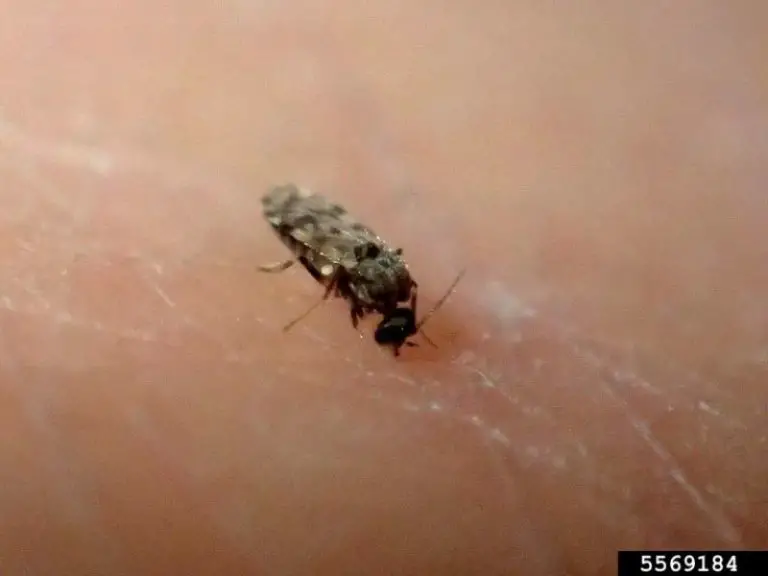9 Natural Enemies to Bed Bugs (#9 is the Worst)
Bed bugs are just the size of an apple seed, and they can eat only blood and nothing else. They are somewhere at the bottom of the food chain and you might be wondering if there are predators that you may count on that can prey on them.
Natural enemies to bed bugs include spiders, cockroaches, centipedes, kissing bugs, masked hunters, and ladybugs. Many species of ants such as fire ants and Asian needle ants eat bed bugs, too. Among reptiles, only lizards are known to eat bed bugs, with common house geckos spearheading the list.
Here’s the full list of natural enemies of bed bugs:
- Spiders that do not weave webs
- Cockroaches
- Centipedes
- Kissing bugs
- Masked hunters
- Ladybugs
- Some ant species
- House geckos
- Humans
Want to know more? Keep reading, but first here’s a pro-tip: Exposing bed bugs to high temperatures (over 120°F) kills in a matter of minutes. If you want to get rid of bed bugs without calling an exterminator check the best steam cleaners that produce over 300°F on Amazon now.
Do Spiders Eat Bed Bugs?
Refrain from believing that spiders tend to crawl on the bodies of sleeping humans and that’s why they end up being accidentally swallowed.
There is no truth to this! What’s true, however, is that bed bugs crawl on you at night to feast on your blood. And if a spider spots a bed bug crawling on you, it might even save you from it by eating it.
Spiders eat bed bugs. Unfortunately, not all species of spiders are fond of consuming bed bugs. Spiders that do not spin webs, in particular, are those that are capable of hunting down and eating bed bugs.
Most spiders spin webs for a couple of reasons.
First, it’s to keep their eggs out of harm’s way by waiting for them to hatch where nothing can touch them.
Second, it’s to allow them to catch their food without trouble — the favorite meals of spiders capable of spinning webs are tiny flying insects.
This takes us to the reason why a lot of spiders, particularly those who spin webs, are not effective for dealing with a bed bug infestation: bed bugs do not fly.
And even though bed bugs can crawl, it is so unlikely for them to crawl on spider webs. That’s because spider webs do not make for excellent hiding places for those bloodsuckers.
However, there are also species of spiders that do not spin webs. Without webs that can help them catch flying insects, they have no choice but to be proactive when looking for meals.
Instead of setting up traps and waiting for food to come their way, they go around and find food themselves. Some of them are:
- Philodromid or running crab spiders
- Jumping spiders
- Niagara spiders
- Wolf spiders
Contrary to popular belief, not all spiders are venomous.
As a matter of fact, only two of the more than 3,000 species of spiders in North America are known to be able to kill humans with their bites.
They’re none other than the black widow and the brown recluse — it’s not just bed bugs that they can kill if you place them in your bedroom but also you!
But even if you catch non-poisonous spiders and set them free in your room to get rid of bed bugs, still you may not be able to get to sleep each time.
Especially if you are like most people who are freaked out by spiders, the thought of their eight eyes staring at you and their eight hairy legs crawling on your body can keep you wide awake at night.
Do Cockroaches Eat Bed Bugs?
Everyone can agree that cockroaches are disgusting critters. Other than the fact that they can spread a host of disease-causing microorganisms because they tend to crawl on practically anything and then head straight to your food, cockroaches stink, too.
They can also eat anything, from human food, plants to insects.
Cockroaches eat bed bugs. In fact, they are right next to one another in the food chain because both of them tend to feed at night — when the sun goes down, bed bugs search for blood and cockroaches look for food. And if cockroaches come across bed bugs, they won’t hesitate to hunt them.
Although it’s likely that any type of cockroach will eat bed bugs, some species are known to love eating bed bugs more, such as oriental cockroaches, German cockroaches, and American cockroaches.
American cockroaches are the largest of all common cockroaches. They are also known as “water bugs”, although they are not aquatic creatures.
Most people have an extremely difficult time accepting the fact that they could be sharing their homes with cockroaches.
The possibility of having cockroaches darting all across the bedroom can be even more challenging to accept. This is why using cockroaches as natural solutions to a bed bug infestation may not be the best idea there is.
Besides, having a cockroach infestation is worse than having a bed bug infestation. That’s because cockroaches can transmit an assortment of diseases.
On the other hand, based on numerous studies, bed bugs do not spread any disease. Some health concerns that cockroaches are known to spread include:
- Salmonellosis
- Cholera
- Dysentery
- Listeriosis
- Campylobacteriosis
- Typhoid fever
- Leprosy
Based on these facts, if you had to choose between a bed bug infestation and a cockroach infestation, it’s clear that you would probably rather share the room with bed bugs than cockroaches.
The worst things that bed bugs can do is consume your blood. On the other hand, cockroaches can put your health and even your life at risk!
Do Centipedes Eat Bed Bugs?

For a lot of people, some of the creepiest insects ever to crawl on the face of the planet are centipedes. It’s because they have lots of legs and can crawl really fast. They are also known to devour just about anything that’s in their way, especially when they are hungry.
Centipedes eat bed bugs mainly because they are carnivorous, which means that they will kill and eat other animals. While centipedes love eating soft-bodied creatures, such as worms, they also like dragonflies, spiders, ants, and bed bugs. Centipedes are known to eat other centipedes too.
Despite what they’re called, centipedes do not have 100 legs. That’s impossible because they always have an odd number of legs attached to their elongated bodies.
The number of legs centipedes have depends on their size. Most centipedes can have anywhere from 15 to 177 legs, although larger species can have more than 300 legs.
On the other hand, bed bugs only have six legs each. Most people would rather have six-legged creatures crawl on their bodies than those with a lot of legs.
If you are one of them, chances are that you will find introducing some centipedes into your room to get rid of a bed bug infestation as not the best option.
Here’s another reason why it is a terrible idea to fight bed bugs with centipedes: they can cause painful bites.
And if you are allergic to bee and wasp stings, getting bitten by a centipede should be a major cause of alarm.
It’s because they have venoms that contain toxins which can cause serious allergic reactions in some people.
Do Kissing Bugs Eat Bed Bugs?
Many insects drink blood to survive. Some examples of them are kissing bugs.
Although kissing bugs prefer consuming the blood of humans and animals, they won’t hesitate to eat insects around them, too, including bed bugs. The problem with using kissing bugs to get rid of a bed bug infestation is that they can cause a bigger problem.
Refrain from assuming that kissing bugs are sweet and romantic insects just because they are called as such.
Here’s the reason why they are called kissing bugs: they prefer to obtain the blood of humans near their mouths. It’s for this reason exactly why they are sometimes referred to as “vampire bugs”.
Members of the large family of assassin bugs, they will stop at nothing just to get their dose of blood, even if it means drinking the blood of animals such as dogs and cats.
Like bed bugs, they are nocturnal creatures. This means that they come out at night to feast on your blood without your knowledge.
Bed bugs are not known to spread diseases, which means that the worst thing that they can do is leave you scratching all over and keep you from having a good night’s sleep due to the stress and anxiety that their presence can bring.
On the other hand, kissing bugs are known to spread Chagas disease, which can cause serious complications.
Also referred to by people in the medical community as “American trypanosomiasis” because it’s common in the Americas, Chagas disease can cause the following signs and symptoms:
- Fever
- Fatigue
- Body aches
- Rash
- Swelling of the bite area
- Loss of appetite
- Vomiting
- Diarrhea
- Gland enlargement
Chagas disease may not produce signs and symptoms as soon as a person is infected with it. That’s a bummer because the medication for it can only work if it’s administered as soon as possible.
Once you get Chagas disease, you may have it for life. In some people, it may lead to death due to problems with the heart and digestive system.
Do Masked Hunters Eat Bed Bugs?
Some other members of assassin bugs are masked hunters, which kind of look the same as kissing bugs.
Masked hunters eat bed bugs because they are fond of feasting on the blood of small insects. A few examples of their preferred meals include lacewings, earwigs, and bed bugs. Because masked hunters do not like human blood, it seems like they make for great remedies for a bed bug infestation.
Even though masked hunters are related to kissing bugs, there are a couple of things that make them easier to love than kissing bugs.
First, as mentioned earlier, they are not fond of drinking human blood, which means that they won’t bite you when hungry. However, they may have no choice but to bite you when they feel threatened by you.
Second, masked hunters do not spread Chagas disease, which is primarily spread by kissing bugs.
So, in other words, there is no need for you to get medical attention after being bitten by a masked hunter bug, which tends to cause a lot of pain, according to people who have already been bitten by them.
Counting on masked hunters to deal with a bed bug infestation, sadly, is not a practical solution. Once all the bed bugs in your room are gone, you are left with another infestation to deal with.
And although masked hunters won’t touch your blood, they may bite you if you accidentally rolled over them while lying in bed.
Do Ladybugs Eat Bed Bugs?
Ladybugs eat bed bug nymphs instead of adult ones, many of which are their size. Aside from bed bugs, ladybugs also eat aphids and other pests in plants. It’s because of this exactly why farmers and gardeners are fond of ladybugs.

Unlike most other insects, ladybugs are pretty. This is why you can find all kinds of ladybug refrigerator magnets, picture frames, greeting cards, hair accessories, party favors, and many others.
But, just like a lot of insects, ladybugs are carnivorous creatures. So, in other words, they nourish their nice-looking selves by eating other insects.
What’s really nice about ladybugs is that each one of them can eat as many as 5,000 insects in its lifetime, which makes them a perfect natural enemy to bed bugs.
By doing the math, it’s safe to assume that welcoming a handful of ladybugs into your room can help put a bed bug-related problem to an end, although, as mentioned earlier, they may stay away from adult bed bugs larger than them.
Although ladybugs are not known to bite humans, which is something that makes them adorable other than their appearance, they are notorious for releasing a stinky substance each time they feel threatened.
It is completely up to you to choose between the smell produced by ladybugs and the odor generated by a bed bug infestation.
By the way, before we talk about another natural enemy to bed bugs, let us first briefly discuss some interesting facts on ladybugs.
Despite their name, not all ladybugs are females — they can be males, too. Females tend to be larger than males. Also, in many cultures, ladybugs are considered as bringers of good fortune.
Do Ants Eat Bed Bugs?
Some ant species prefer to eat bed bugs more than the rest. However, it is unlikely for ants to deliberately kill bed bugs for food. Often, they will devour only dead ones that they come across. This is why they are not effective all-natural solutions to a bed bug infestation.
There are over 12,000 species of ants known to man. There are also lots of entries on the list of foods that they eat.
Ants can eat just about anything that comes their way, ranging from grains, fruits, vegetables to baked goodies. They are also known to consume dead animals and insects, including dead ants themselves.
Some ants that are likely to turn to bed bugs for food are large ones with stingers that release venom.
It’s exactly because of this why it is a terrible idea to place some of them in your bedroom to get rid of those bed bugs — aside from bed bugs, they may sting you, too. Most of the time, ant stings can be quite painful.
For instance, fire ants are more aggressive than other ant species, which is why it is more likely for them to eat any bed bugs that they will encounter.
Unfortunately, just like what they’re called suggests, their sting can cause an intense burning sensation, the kind that will make you regret trusting them to help you end a bed bug infestation.
Aside from fire ants, other types of ants that may kill or eat bed bugs include:
- Argentine ants
- Carpenter ants
- Pharaoh ants
- Asian needle ants
Speaking of Asian needle ants, these ant species are worse than fire ants.
That’s because their venom is so toxic that it can leave a person that they sting to suffer from anaphylactic shock — a severe allergic reaction that can cause your airways to close, your blood pressure to drop suddenly, and your heart to stop beating.
Even if you use non-deadly ant species in your attempt to eliminate all bed bugs in your bedroom, it’s still not a good idea. That’s because ants can multiply rapidly as their queens can lay hundreds of eggs per day.
Due to this, you may have a challenging time trying to get rid of them once they take over your bedroom.
Do Lizards Eat Bed Bugs?
Some lizard species of them are notorious for having an appetite for bed bugs, and leading the list are common house geckos. Lizards that are kept as exotic pets may also eat bed bugs. Some examples are bearded dragons, leopard geckos, gold-dust day geckos, and crested geckos.

People residing in areas on the planet where there are lots of common house geckos, which are native to Southeast Asia, tend to encounter fewer insects indoors.
That’s because the diet of common house geckos consists of a very long list of insects. Just about anything that’s crawling, jumping or flying tends to end up in the mouths of these reptiles.
If you are thinking about getting your hands on geckos and turning them into pets just to get rid of bed bugs residing in your room, think again.
Especially if you are a budget-conscious and very busy individual, using lizards is not the most practical and effective all-natural way to deal with a bed bug infestation.
For one, some breeds of geckos, particularly rare ones, can carry a price tag of more than $1,000.
Professional bed bug extermination, on the other hand, can cost as low as $500 only, depending on the severity of the infestation and the number of rooms that require treatment.
In other words, it may be cheaper to get in touch with the pros than get a gecko.
While some geckos may be easier on the pocket, such as some species of leopard geckos that can cost around $30 only, keeping them as pets may not be cheap.
That’s because lizards are cold-blooded animals, and making sure that your bedroom provides them with a favorable environment requires shelling out a huge sum of money.
If you are on a tight budget and you live in a tropical region, you may try catching a lot of common house geckos and setting them free in your bedroom so that they may start feasting on bed bugs.
However, they may fail to devour those that are in tight cracks and crevices, which are the favorite hiding places of bed bugs.
Do Bed Bugs Eat Bed Bugs?
Bed bugs do not eat bed bugs. They are not interested in consuming the blood of their kind as they are cold-blooded — bed bugs are drawn to a human’s warm body. This is why, when trapped in plastic bags for months, they die of starvation, a proof that bed bug cannibalism is not an option.
Some insects are known to kill their own kind. For instance, female praying mantises and black widow spiders murder males during or after mating.
And now you may be wondering if there is a possibility for female bed bugs to be doing the same, or if they will resort to sucking each other’s blood if a human host is not available to supply them with food.
If only bed bugs ate bed bugs, then no one on the planet would have a problem with a bed bug infestation.
As a matter of fact, this article talking about some of the natural enemies to bed bugs wouldn’t exist because no one would be looking up online some home remedies for a bed bug infestation, which would be self-resolving.
However, that’s not the case. Since bed bugs do not eat one another for survival or for telling each other who’s boss, you cannot solve a bed bug infestation with bed bugs.
You have no choice but to count on some bed bug-eating insects mentioned above, although you will have to deal with them after they have eaten all the bed bugs in your room.
Besides, here’s what’s more likely to happen: when bed bugs encounter one another, instead of eating one another they may mate with each other.
While bed bugs may not be able to jump or fly, they are highly capable of making a lot of babies — according to some sources, female bed bugs can lay one to seven eggs a day!
How About Cats and Dogs?
The assistance of bed bug-sniffing dogs, sadly, begins and ends with helping professional exterminators to locate bed bugs. So, in other words, dog do not kill bed bugs. That’s because bed bugs are not part of their diet, although vets say it’s not dangerous for dogs to eat insects.
Perhaps you have already heard or read about bed bug-sniffing dogs.
Just like what the name says, these are dogs that have been trained to sniff bed bugs — dogs have a far more superior sense of smell than humans, and they can be trained to detect drugs, bombs, and many others with the use of their noses.
Just like dogs, cats have a phenomenal sense of smell, which means that they can also be trained to track down bed bugs using their noses.
However, professional exterminators prefer to count on dogs than cats. It’s no secret that cats can easily get distracted — a ball of yarn can make them forget about hunting bed bugs altogether.
Cats and dogs may accidentally eat bed bugs, such as when they put infested items in their mouths.
It’s unlikely that they will deliberately consume bed bugs and help you get rid of a bed bug infestation.
Besides, bed bugs tend to give off an unfavorable smell, which makes them unappetizing for our adorable furry pals.
Before we proceed, here’s a fact: if bed bugs cannot find human blood, they will settle for the blood of cats and dogs.
It’s easy for bed bugs to find them because, just like humans, these domesticated animals are warm-blooded and exhale carbon dioxide, too — bed bugs are attracted to humans’ warm bodies and the carbon dioxide they exhale.
This is another reason why it’s a must that you put an end to a bed bug infestation. Other than your blood, the blood of your pets can also be on the line.
Bed bugs may not live on cats and dogs like other insects such as ticks, fleas, mites, and lice. However, they can still consume their blood if they have no access to yours.
The Best Natural Enemy to Bed Bugs
Bed bugs are somewhere near the bottom of the food chain, and many of the creatures just above these blood-sucking insects are known to devour them.
However, there is one that is somewhere near the top of the food chain that can execute bed bugs, although without putting them in its mouth. It’s none other than you.
Human beings are the number one natural enemies to bed bugs. It doesn’t come as a surprise since they do not like sharing their bedrooms with bed bugs that feed on their blood while they’re going to sleep.
Fortunately, there are many home remedies for bed bugs that you may count on if their presence is causing you to scratch all over and lose some precious sleep.
Rubbing alcohol, lavender essential oil, diatomaceous earth, vinegar, double-sided tape — these are some of the most commonly used weapons against bed bugs.
As you have learned above, there are also various insects and animals that may help you bring a bed bug infestation to an end.
Sadly, having them in your bedroom may not be the quickest and most effective remedy for bed bugs. What’s more, the use of bed bugs’ natural enemies may do more harm than good eventually.
Because of this, it’s a much better idea to stick to DIY remedies for bed bugs whose effectiveness and safety are vouched for by many homeowners.
Or you may also leave the job to professional exterminators instead of spiders, cockroaches, centipedes, kissing bugs, and others that we mentioned above.
Just Before You Welcome Some Bed Bug Natural Enemies Into Your Bedroom
Bed bugs have many natural enemies. In the wild, letting nature take its course by allowing their predators to eat them can help keep them from multiplying uncontrollably.
However, since it’s your bedroom that is the venue, trying to deal with bed bugs by signing up some of their leading enemies may not be a smart move.
Many of those that consume bed bugs are not programmed to hunt down these creepy crawlers — usually, they will eat bed bugs only when they chance upon them.
It’s because of this exactly why the bed bug infestation may keep on progressing as the number of bed bugs hatching from eggs is more than the number of those being eaten.
Besides, some of bed bugs’ natural enemies may cause additional problems. For instance, cockroaches and kissing bugs may spread diseases, and some species of ants may leave you in pain.
Due to this, you are better off exploring other options, especially those that will allow you to eliminate bed bugs without complications.
Photo credit: ©canva.com/mgkuypers, ©canva.com/ByronRH
Medical Disclaimer: TheHomePestControl is a digital publisher and does not offer personal health or medical advice. The contents of this website are not intended to substitute for professional medical advice, diagnosis, or treatment.
Affiliate Disclaimer: As an Amazon Associate, I earn from qualifying purchases made on our website. If you make a purchase through links from this website, I may earn a commission at no additional cost to you.






